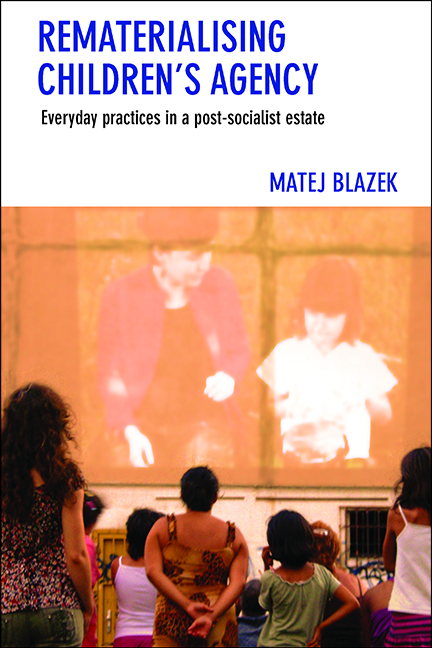one - Introduction
Published online by Cambridge University Press: 01 September 2022
Summary
This book asks four questions: What do children do? Where do their actions come from? What can they do? And what does this imply for adults? It explores everyday practices of children (aged 5–14) from Kopčany, at the time of the fieldwork a deprived and isolated neighbourhood on the outskirts of the Slovak capital Bratislava, where I spent one year in a dual role of ethnographer and youth worker. By investigating the circumstances in which these practices are embedded and from which they emerge, the book builds an account of the formation of children’s agency and of this agency as constituting the place where children live.
The question of children’s agency has come under the spotlight in a range of recent debates, including the scholarly interest in children’s capacities to act and ‘make a difference’ (Oswell, 2013, p.6), the policy-driven focus on children’s wellbeing (van Nijnatten, 2013), or on children as social agents with distinctive rights in the context of global development (Lieten, 2008). I seek to address some gaps in these debates and contribute to the existing understandings of children’s agency in three ways. The main contribution comes from the material on which the book is based. This is first and foremost an ethnographic story of children’s practices, a thick empirical account generated in the role of a youth worker in Kopčany. The book employs a strongly empiricist approach to theorising children’s agency; the theory is grounded in, and built from, the field experience. I offer a justification for this approach in three chapters of Part Two on the grounds of the links between the social and spatial positionality of the children in Kopčany and the marginalisation they experience. But the ethnography is also a reflexive account of my encounters with children and adults (neighbourhood residents, youth workers and others) in the neighbourhood. Adults–children is thus only one axis of difference reflected in this book. Another one is established between my roles as a researcher and a youth worker, and I unpick how different preconceptions of who we make ourselves as adults are important for how we can engage with children. I refer to my stay in Kopčany by various terms in the book – as research, project, practice or fieldwork – underlining the complex and yet heterogeneous nature of the work.
- Type
- Chapter
- Information
- Rematerialising Children's AgencyEveryday Practices in a Post-Socialist Estate, pp. 3 - 18Publisher: Bristol University PressPrint publication year: 2015



